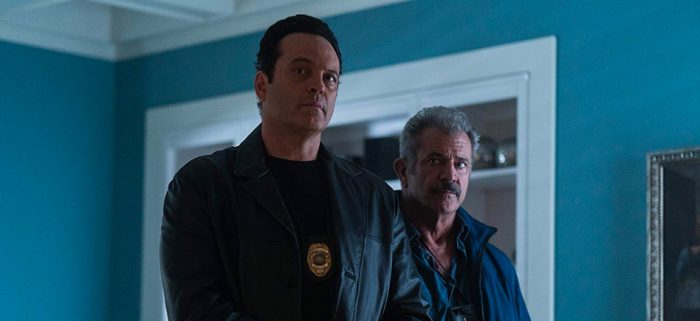'Dragged Across Concrete' Review: A Nasty, Nihilistic Nightmare Designed To Provoke
S. Craig Zahler has made a name for himself through chaotic nihilism. He specializes in what he has personally described as "hybrid movies" – films that blend several different genres into bloody, angry, sometimes funny stories that defy traditional classification. With Bone Tomahawk and Brawl in Cell Block 99, Zahler has already developed a cult following. Fans who are willing to subscribe to his particular brand of madness. I can't say I'm one of them.
Up until now, I've found Zahler's work too unappealing to latch onto. Even when he's going full schlock, as he did with his script for Puppet Master: The Littlest Reich, he never quite sticks the landing in my mind. But with his latest brutalist opus, Dragged Across Concrete, the writer and director may have finally hit his stride. Here is a nasty, nihilistic nightmare deliberately designed to provoke. It does its job – and then some.
Much has already been said about Dragged Across Concrete and its intentions, and the intentions of its filmmaker. By casting Mel Gibson and Vince Vaughn – two actors who can easily be classified as "conservatives" – in the leads, some have accused Zahler of deliberately tailoring his crime saga to the right-wing crowd. Gibson's presence alone seems like a huge "fuck you" – dropping the controversial actor known for spouting racist comments into the role of a full-blown racist cop. There's no subtext there – there's just text.
None of this sounds very pleasant, and indeed, Dragged Across Concrete might be one of the most unpleasant films in recent memory, exacerbated by the fact that it runs for a soul-numbing 159 minutes. And yet I cannot deny that Dragged Across Concrete works. In terms of content, it's a terrible film. In terms of craft, it's nothing short of remarkable. Whatever it is I've been missing while watching Zahler's other projects is on full-display here. The writer-director has set out to tell a story about terrible people in a terrible world, and he's succeeded.
Gibson and Vaughn play two cops who are more than happy to stomp in a few heads – especially when the suspects they're dealing with are minorities. Vaughn's Anthony Lurasetti is the softer of the two – the one who seems to have an actual conscience. But that doesn't stop him from engaging or encouraging brutality. Gibson's Brett Ridgeman, meanwhile, has no qualms about how terrible he is. Gibson growls his way through the part, and while I certainly can't commend Gibson as a human being, his performance here is some of the best work he's done in years. Perhaps it's because he knows exactly who this character is – which is admittedly disturbing.
After some of their racist brutality is caught on camera, Ridgeman and Lurasetti are both suspended without pay. This is a big problem for Ridgeman – his wife has high medical bills, and his teen daughter is being constantly harassed by the African American youths in their neighborhood. "I never thought I was racist till we moved here," Ridgeman's wife (Laurie Holden) mutters bitterly when discussing their daughter's latest encounter. Ridgeman wants to earn enough money to move his family elsewhere. Lurasetti, meanwhile, wants enough dough to buy an impressive rock to propose to his girlfriend. What are two men of violence to do, but seek out a violent act to pull off a big score?
While Gibson and Vaughn are the biggest names here, they're not the only leads in Dragged Across Concrete. There's a third character front and center – Henry Johns (Tory Kittles), an ex-con trying to get back on his feet. Henry also has money and family problems he wants to fix, and he turns to an old friend (Michael Jai White) to help him land some serious scratch.
As I'm sure you can guess, all of these characters are slowly moving towards each other, and the result won't be pretty. In the midst of all this, Zahler introduces an abrupt subplot involving a new mother (Jennifer Carpenter) who doesn't want to return to her job at a bank. She simply wants to spend more time with her baby. But her husband insists she's taken enough time off, and all but forces her to go back to the grind. This scenario results in the most shocking moment in the film – a moment that might turn some viewers off entirely. Oddly enough, as nasty as this situation ended up being, it was the thing that finally sold me on Dragged Across Concrete. I felt at last I understood what Zahler was going for her: a portrait of a violent, unforgiving American landscape, where very few people are innocent, and even those that are can never get away clean.
Zahler's script is littered with hard boiled pulp dialogue that never sounds natural – but that seems like the point. The characters here aren't cool, smart guys firing off slick dialogue. Their brutal lunkheads trying to talk like the tough guys they've seen in movies. Every character here moves and behaves like they're playing a part; imitating an idea they've picked up somewhere. Ultimately, they're hollow inside. But that doesn't make them hollow characters.
Cinematographer Benji Bakshi gives Dragged Across Concrete a dark, ugly look to match its dark, ugly material. And Zahler never once attempts to capture a shot that could be construed as beautiful. This is an ugly landscape, and the only bursts of color come from sudden eruptions of blood and gore. I can't imagine a wide audience will take to this film, and I don't know If I'll ever feel the need to rewatch it myself. I cannot, however, deny the raw, grotesque power here. Like it or not, Dragged Across Concrete is trying to overwhelm, unsettle and disturb you.
/Film Rating: 8 out of 10

